Hyundai Matrix 2007 Owner's Manual
Manufacturer: HYUNDAI, Model Year: 2007, Model line: Matrix, Model: Hyundai Matrix 2007Pages: 490, PDF Size: 12.81 MB
Page 301 of 490

1CONTROLS AND EQUIPMENT
22
SB090R1-F To Release the Seat Belt
The seat belt is released by pressing the release button in the locking buckle. When it is released, the belt should auto- matically draw back into the retractor.If this does not happen, check the belt to be sure it is not twisted, then try again. B220A01FC-EAT SEAT BELTS - Centre Rear Seat 3-Point System With EmergencyLocking Retractor(Not all models)
1. Before fastening the rear seat centre
belt, confirm the metal tab (a) and buckle (b) are latched together.
2. After confirming that (a) and (b) are
latched, pull the seat belt out of theretractor and insert the metal tab (c) into the buckle (d).
B220A01FC
B210A01L-R
B200A01S-GAT Adjusting Your Seat Belt You should place the belt as low as possible on your hips, not on your waist. If the belt is located too high on yourbody, you could slide under it in case of accident or a sudden stop. This could result of death, serious injury or prop-erty damage. Both arms should not be under or over the belt. Rather, one should be over and the other under, asshown in the illustration. Never wear the seat belt under the arm nearest to the door.B200A01L-D
fcuk-1.p65
12/27/2006, 10:11 AM
22
Page 302 of 490

1
CONTROLS AND EQUIPMENT
23
There will be an audible "click" when the tab locks in the buckle. The seat beltautomatically adjusts to the proper length only after the lap belt is adjusted manu- ally so that it fits snugly around yourhips. If you lean forward in a slow, easy motion, the belt will extend and let you move around. If there is a sudden stopor impact, the belt will lock into position. It will also lock if you try to lean forward too quickly.
B220A02Y-D
!
!WARNING:
o When using the rear seat centre belt, you must lock all metal tabs and buckles. If any metal tab or buckle is not locked, it will in-crease the chance of injury in the event of collision.
o Never unlock the metal tab (a) and
the buckle (b) with the followingexceptions.
(1) In case of folding rear seatbacks
down.
(2) If transporting an object on the
rear seat may cause damage tothe rear seat centre belt.
o Lock the metal tab (a) and the
buckle (b) immediately after fold-ing rear seatbacks up. B220C01A-EAT To Release the Seat Belt
When you want to release the seat belt, press the button in the locking buckle.
WARNING:
The centre lap belt latching mecha-nism is different from those for the rear seat shoulder belts. When fas- tening the rear seat shoulder belts orthe centre lap belt, make sure they are inserted into the correct buckles to obtain maximum protection fromthe seat belt system and assure proper operation.
B220C02FC
fcuk-1.p65 12/27/2006, 10:11 AM
23
Page 303 of 490
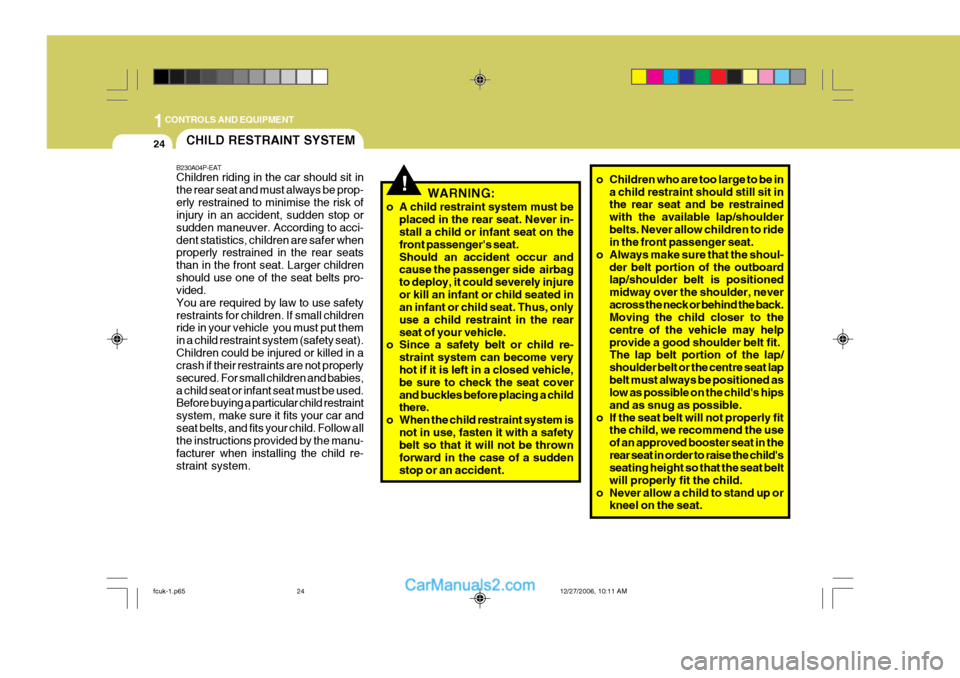
1CONTROLS AND EQUIPMENT
24
B230A04P-EAT Children riding in the car should sit in the rear seat and must always be prop-erly restrained to minimise the risk of injury in an accident, sudden stop or sudden maneuver. According to acci-dent statistics, children are safer when properly restrained in the rear seats than in the front seat. Larger childrenshould use one of the seat belts pro- vided. You are required by law to use safetyrestraints for children. If small children ride in your vehicle you must put them in a child restraint system (safety seat).Children could be injured or killed in a crash if their restraints are not properly secured. For small children and babies,a child seat or infant seat must be used. Before buying a particular child restraint system, make sure it fits your car andseat belts, and fits your child. Follow all the instructions provided by the manu- facturer when installing the child re-straint system.CHILD RESTRAINT SYSTEM
!WARNING:
o A child restraint system must be placed in the rear seat. Never in- stall a child or infant seat on the front passenger's seat.Should an accident occur and cause the passenger side airbag to deploy, it could severely injureor kill an infant or child seated in an infant or child seat. Thus, only use a child restraint in the rearseat of your vehicle.
o Since a safety belt or child re-
straint system can become very hot if it is left in a closed vehicle, be sure to check the seat coverand buckles before placing a child there.
o When the child restraint system is not in use, fasten it with a safetybelt so that it will not be thrown forward in the case of a suddenstop or an accident. o Children who are too large to be in
a child restraint should still sit in the rear seat and be restrained with the available lap/shoulderbelts. Never allow children to ride in the front passenger seat.
o Always make sure that the shoul-
der belt portion of the outboardlap/shoulder belt is positioned midway over the shoulder, neveracross the neck or behind the back. Moving the child closer to the centre of the vehicle may helpprovide a good shoulder belt fit. The lap belt portion of the lap/ shoulder belt or the centre seat lapbelt must always be positioned as low as possible on the child's hips and as snug as possible.
o If the seat belt will not properly fit the child, we recommend the useof an approved booster seat in therear seat in order to raise the child's seating height so that the seat belt will properly fit the child.
o Never allow a child to stand up or kneel on the seat.
fcuk-1.p65 12/27/2006, 10:11 AM
24
Page 304 of 490
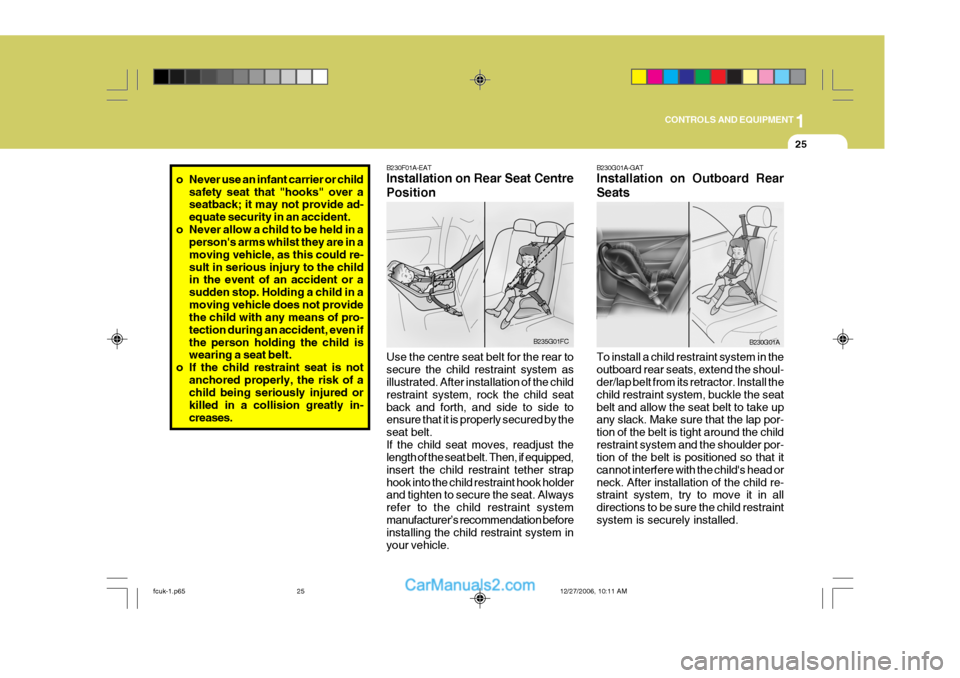
1
CONTROLS AND EQUIPMENT
25
o Never use an infant carrier or child
safety seat that "hooks" over a seatback; it may not provide ad- equate security in an accident.
o Never allow a child to be held in a person's arms whilst they are in amoving vehicle, as this could re-sult in serious injury to the child in the event of an accident or a sudden stop. Holding a child in amoving vehicle does not provide the child with any means of pro- tection during an accident, even ifthe person holding the child is wearing a seat belt.
o If the child restraint seat is not
anchored properly, the risk of achild being seriously injured or killed in a collision greatly in-creases. B230F01A-EAT Installation on Rear Seat Centre Position Use the centre seat belt for the rear to secure the child restraint system as illustrated. After installation of the child restraint system, rock the child seatback and forth, and side to side to ensure that it is properly secured by the seat belt.If the child seat moves, readjust the length of the seat belt. Then, if equipped, insert the child restraint tether straphook into the child restraint hook holder and tighten to secure the seat. Always refer to the child restraint systemmanufacturer’s recommendation before installing the child restraint system in your vehicle.
B235G01FC
B230G01A-GAT Installation on Outboard Rear Seats To install a child restraint system in the outboard rear seats, extend the shoul- der/lap belt from its retractor. Install the child restraint system, buckle the seatbelt and allow the seat belt to take up any slack. Make sure that the lap por- tion of the belt is tight around the childrestraint system and the shoulder por- tion of the belt is positioned so that it cannot interfere with the child's head orneck. After installation of the child re- straint system, try to move it in all directions to be sure the child restraintsystem is securely installed.
B230G01A
fcuk-1.p65
12/27/2006, 10:11 AM
25
Page 305 of 490
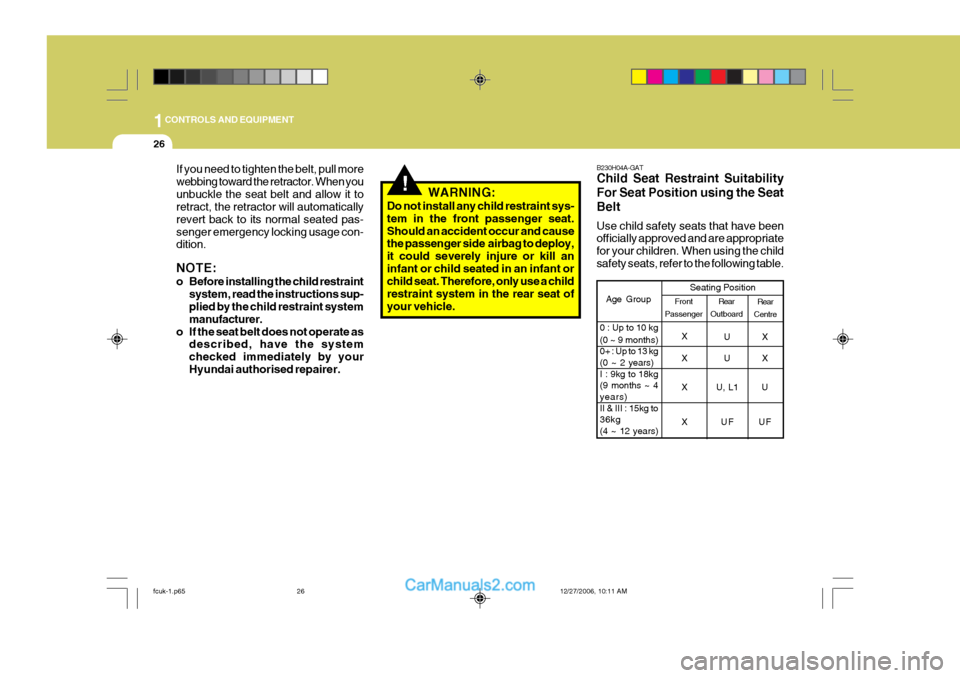
1CONTROLS AND EQUIPMENT
26
!
If you need to tighten the belt, pull more webbing toward the retractor. When youunbuckle the seat belt and allow it to retract, the retractor will automatically revert back to its normal seated pas-senger emergency locking usage con- dition. NOTE:
o Before installing the child restraint
system, read the instructions sup- plied by the child restraint system manufacturer.
o If the seat belt does not operate as described, have the systemchecked immediately by yourHyundai authorised repairer. WARNING:
Do not install any child restraint sys-tem in the front passenger seat.Should an accident occur and cause the passenger side airbag to deploy, it could severely injure or kill aninfant or child seated in an infant or child seat. Therefore, only use a child restraint system in the rear seat ofyour vehicle. Rear
Centre
Age Group Seating Position
UX
XUX
X U, L1 U XU FUF
Rear
Outboard
Front
Passenger
0 : Up to 10 kg (0 ~ 9 months) 0+ : Up to 13 kg (0 ~ 2 years) I : 9kg to 18kg(9 months ~ 4 years) II & III : 15kg to36kg (4 ~ 12 years) X
B230H04A-GAT Child Seat Restraint Suitability For Seat Position using the SeatBelt Use child safety seats that have been officially approved and are appropriate for your children. When using the childsafety seats, refer to the following table.
fcuk-1.p65
12/27/2006, 10:11 AM
26
Page 306 of 490
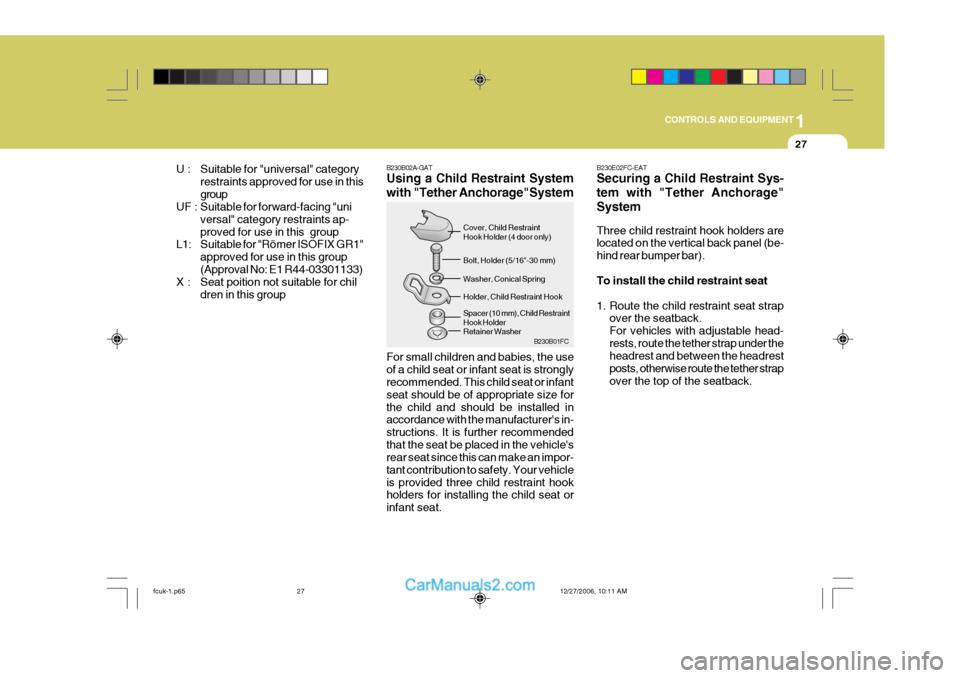
1
CONTROLS AND EQUIPMENT
27
B230B02A-GAT Using a Child Restraint System
with "Tether Anchorag
e"System
For small children and babies, the use of a child seat or infant seat is strongly recommended. This child seat or infant seat should be of appropriate size forthe child and should be installed in accordance with the manufacturer's in- structions. It is further recommendedthat the seat be placed in the vehicle's rear seat since this can make an impor- tant contribution to safety. Your vehicleis provided three child restraint hook holders for installing the child seat or infant seat. B230B01FC
Cover, Child Restraint Hook Holder (4 door only)
Bolt, Holder (5/16"-30 mm) Washer, Conical Spring
Holder, Child Restraint Hook
Spacer (10 mm), Child Restraint Hook Holder Retainer Washer
B230E02FC-EAT Securing a Child Restraint Sys- tem with "Tether Anchorage"System Three child restraint hook holders are located on the vertical back panel (be- hind rear bumper bar). To install the child restraint seat
1. Route the child restraint seat strap over the seatback. For vehicles with adjustable head-rests, route the tether strap under the headrest and between the headrest posts, otherwise route the tether strapover the top of the seatback.
U : Suitable for "universal" category
restraints approved for use in thisgroup
UF : Suitable for forward-facing "uni
versal" category restraints ap-proved for use in this group
L1: Suitable for "Römer ISOFIX GR1"
approved for use in this group(Approval No: E1 R44-03301133)
X : Seat poition not suitable for chil
dren in this group
fcuk-1.p65 12/27/2006, 10:11 AM
27
Page 307 of 490
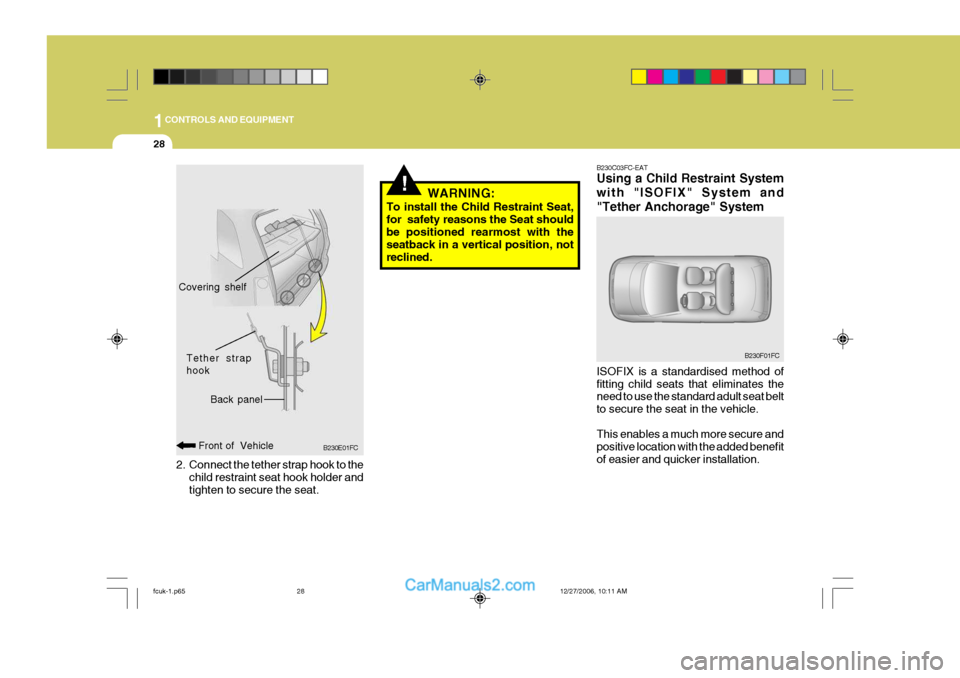
1CONTROLS AND EQUIPMENT
28
B230C03FC-EAT Using a Child Restraint System with "ISOFIX" System and"Tether Anchorage" System
B230F01FC
ISOFIX is a standardised method of fitting child seats that eliminates the need to use the standard adult seat belt to secure the seat in the vehicle. This enables a much more secure and positive location with the added benefitof easier and quicker installation.
!
2. Connect the tether strap hook to the child restraint seat hook holder and tighten to secure the seat. WARNING:
To install the Child Restraint Seat,for safety reasons the Seat should be positioned rearmost with the seatback in a vertical position, notreclined.
B230E01FC
Front of Vehicle
Back panel
Covering shelf
Tether strap hook
fcuk-1.p65 12/27/2006, 10:11 AM
28
Page 308 of 490
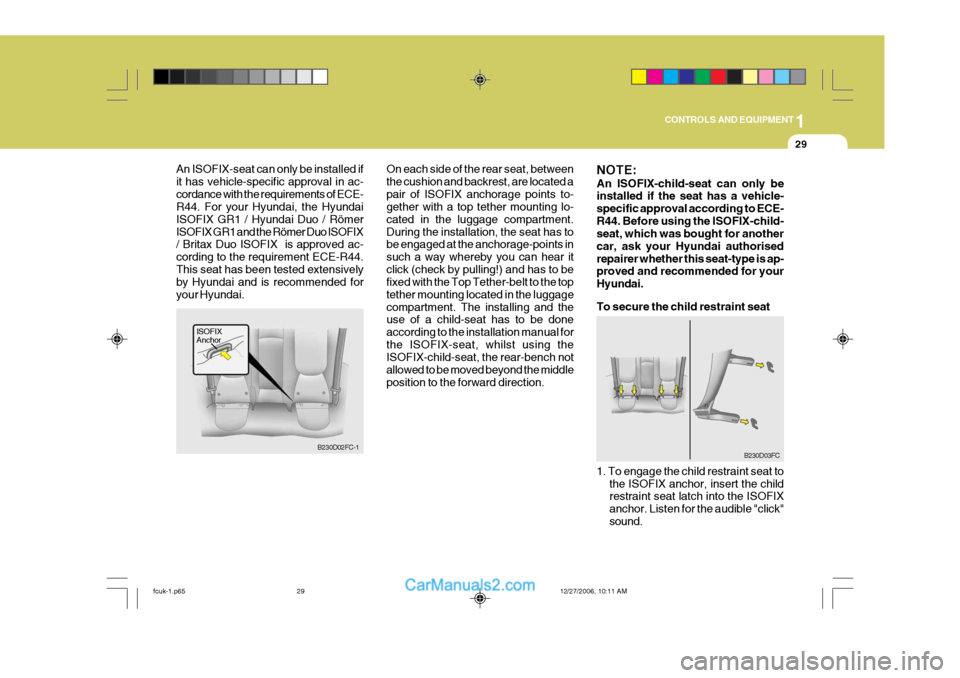
1
CONTROLS AND EQUIPMENT
29
An ISOFIX-seat can only be installed if it has vehicle-specific approval in ac-cordance with the requirements of ECE- R44. For your Hyundai, the Hyundai ISOFIX GR1 / Hyundai Duo / RömerISOFIX GR1 and the Römer Duo ISOFIX / Britax Duo ISOFIX is approved ac- cording to the requirement ECE-R44.This seat has been tested extensively by Hyundai and is recommended for your Hyundai. On each side of the rear seat, betweenthe cushion and backrest, are located apair of ISOFIX anchorage points to- gether with a top tether mounting lo- cated in the luggage compartment.During the installation, the seat has to be engaged at the anchorage-points in such a way whereby you can hear itclick (check by pulling!) and has to be fixed with the Top Tether-belt to the top tether mounting located in the luggagecompartment. The installing and the use of a child-seat has to be done according to the installation manual forthe ISOFIX-seat, whilst using the ISOFIX-child-seat, the rear-bench not allowed to be moved beyond the middleposition to the forward direction.
B230D02FC-1
ISOFIX Anchor
NOTE: An ISOFIX-child-seat can only be installed if the seat has a vehicle- specific approval according to ECE-R44. Before using the ISOFIX-child- seat, which was bought for another car, ask your Hyundai authorisedrepairer whether this seat-type is ap- proved and recommended for your Hyundai. To secure the child restraint seat 1. To engage the child restraint seat to
the ISOFIX anchor, insert the child restraint seat latch into the ISOFIX anchor. Listen for the audible "click"sound.
B230D03FC
fcuk-1.p65 12/27/2006, 10:11 AM
29
Page 309 of 490
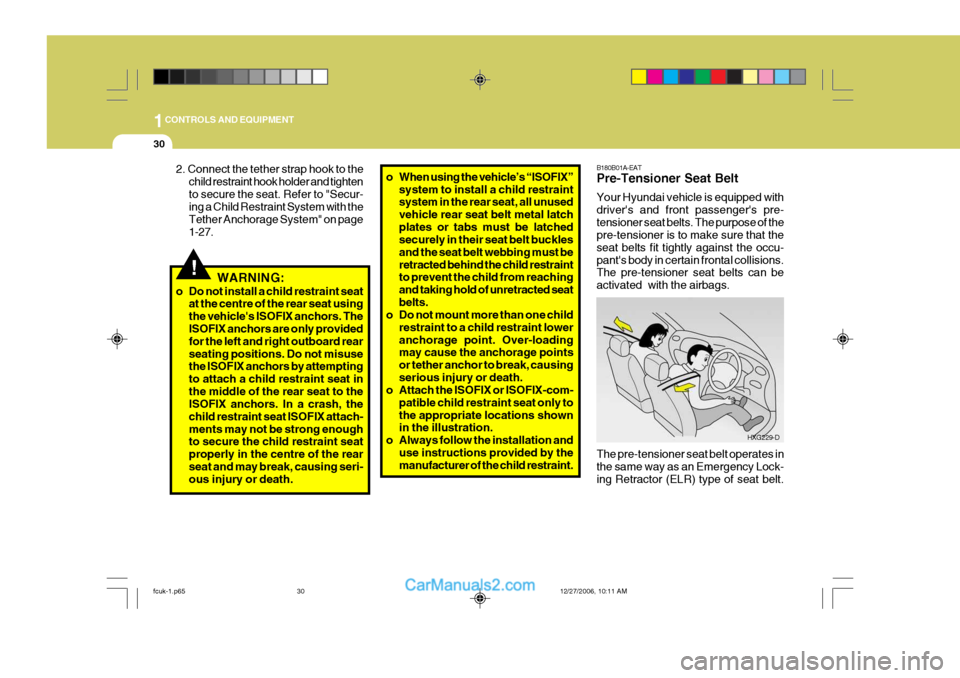
1CONTROLS AND EQUIPMENT
30
B180B01A-EAT Pre-Tensioner Seat Belt Your Hyundai vehicle is equipped with driver's and front passenger's pre-tensioner seat belts. The purpose of the pre-tensioner is to make sure that the seat belts fit tightly against the occu-pant's body in certain frontal collisions. The pre-tensioner seat belts can be activated with the airbags.
HXG229-D
The pre-tensioner seat belt operates in the same way as an Emergency Lock-ing Retractor (ELR) type of seat belt.
2. Connect the tether strap hook to the child restraint hook holder and tighten to secure the seat. Refer to "Secur- ing a Child Restraint System with the Tether Anchorage System" on page1-27.
WARNING:
o Do not install a child restraint seat at the centre of the rear seat usingthe vehicle's ISOFIX anchors. TheISOFIX anchors are only provided for the left and right outboard rear seating positions. Do not misuse the ISOFIX anchors by attempting to attach a child restraint seat inthe middle of the rear seat to the ISOFIX anchors. In a crash, the child restraint seat ISOFIX attach-ments may not be strong enough to secure the child restraint seat properly in the centre of the rearseat and may break, causing seri- ous injury or death.
!
o When using the vehicle’s “ISOFIX”
system to install a child restraint system in the rear seat, all unused vehicle rear seat belt metal latchplates or tabs must be latched securely in their seat belt buckles and the seat belt webbing must beretracted behind the child restraint to prevent the child from reaching and taking hold of unretracted seatbelts.
o Do not mount more than one child
restraint to a child restraint loweranchorage point. Over-loading may cause the anchorage points or tether anchor to break, causingserious injury or death.
o Attach the ISOFIX or ISOFIX-com-
patible child restraint seat only tothe appropriate locations shown in the illustration.
o Always follow the installation and use instructions provided by themanufacturer of the child restraint.
fcuk-1.p65 12/27/2006, 10:11 AM
30
Page 310 of 490

1
CONTROLS AND EQUIPMENT
31
!
When the vehicle stops suddenly, or if the occupant tries to lean forward tooquickly, the seat belt retractor will lock into position. However, in certain frontal collisions, the pre-tensioner will acti-vate and pull the seat belt into tighter contact against the occupant's body. The seat belt pre-tensioner system consists mainly of the following compo-nents. Their locations are shown in the illustration.
1.SRS airbag warning light
2.Seat belt pre-tensioner assembly
3.SRS control module WARNING:
To obtain maximum benefit from apre-tensioner seat belt:
1. The seat belt must be worn cor- rectly.
2. The seat belt must be adjusted to
the correct position. NOTE:
o Both the driver's and front
passenger's pre-tensioner seat belts will be activated in certain frontal collisions. The pre- tensioner seat belts can be acti-vated with the airbags. The pre- tensioners will be activated under these conditions even if the seatbelts are not being worn at the time of the collision.
o When the pre-tensioner seat belts are activated, a loud noise may beheard and fine dust, which may appear to be smoke, may be vis-ible in the passenger compart- ment. These are normal operating conditions and are not hazard-ous.
o Although it is harmless, the fine
dust may cause skin irritation andshould not be breathed for pro- longed periods. Wash your hands and face thoroughly after an acci-dent in which the pre-tensioner seat belts were activated.
1
2
3Passenger's airbagDriver's airbag
B180B01O-D
fcuk-1.p65
12/27/2006, 10:11 AM
31